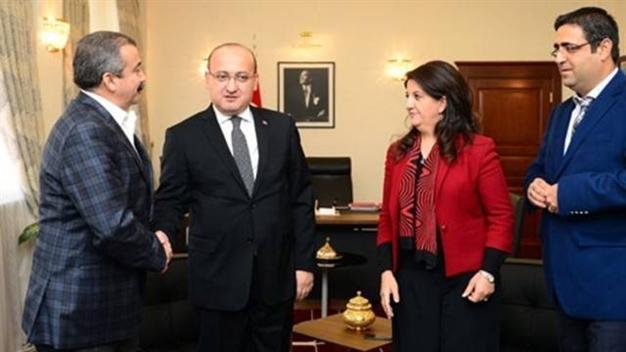Kurdish peace call made amid row on security bill

In a historic joint press conference with the government, the Peoples’ Democratic Party (HDP) has announced a call by the jailed leader of the Kurdistan Workers’ Party (PKK) for the outlawed group to hold a congress in spring to discuss disarmament in Turkey, despite a growing row over the government-led homeland security bill.
“This is a historic declaration of will to replace armed struggle with democratic politics,” the HDP’s Sırrı Süreyya Önder quoted PKK leader Abdullah Öcalan as saying. Öcalan also called for a “reinforced cease-fire,” Önder said at a Feb. 28 joint press conference with government representatives at Istanbul’s Dolmabahçe Palace.
Deputy Prime Minister Yalçın Akdoğan, a key figure in the ongoing process, said silencing arms would “contribute to democratic development,” speaking at the same meeting, which was also attended by Interior Minister Efkan Ala, AKP Deputy Parliamentary Group Chair Mahir Ünal and the HDP’s Pervin Buldan and İdris Baluken.
Although Öcalan’s call has been regarded as a potential turning point to open new opportunities for the future of the peace process, the PKK and the HDP have also urged the government to reconsider its determination to pass the controversial new domestic security bill.
The Kurdistan Communities’ Union (KCK), a supra-organization that includes the PKK, said in a statement on March 1 that the Öcalan’s call is “a breakthrough in the Kurdish problem and great opportunity” for the government and the PKK to bring it to a peaceful end. However, the KCK also said it was time for the Turkish government to take steps, saying the AKP should “withdraw the security package as an indication of good faith.” “Work should start immediately so that [direct] negotiations can begin, with delegations and monitoring bodies being established,” the statement added. The HDP’s Buldan also touched on the internal security bill on March 1 in Diyarbakır, stating that changes would be made to it.
“Some amendments will be made to the internal security package. There are some articles we particularly oppose. We are preparing proposals about these and we will submit these proposals to the AKP,” Buldan said.
“The bill will continue to be discussed in parliament but the articles that have already passed will be able to be amended. We discussed this with the government yesterday. The bill will not pass in its current form,” she added, revealing that the government has agreed to make changes to the bill, which has been widely criticized for increasing the authority of the police and limiting freedoms.
Speaking at his AKP youth congress in Ankara over the weekend, Prime Minister Ahmet Davutoğlu described the announcement as a “new step” in the Kurdish issue, giving credit to President Recep Tayyip Erdoğan. “The solution process, which began with President Erdoğan’s speech in Diyarbakır in 2005, has now taken a new shape,” Davutoğlu said.
10-article statementÖnder summarized Öcalan’s 10 articles, or priorities, in the Feb. 28 statement:
The definition and content of democratic politics. The definition of the national and local dimensions of a democratic solution. Legal and democratic warranties of free citizenship. Relations between state and society, and how these issues will be institutionalized. The socio-economic dimensions of the resolution process.
Handling democracy-security ties during the resolution process in a manner that will sustain both public order and freedoms. Legal solutions and warranties for policies on women, culture and ecology.
Developing a pluralist democracy to define the concept of identity. Defining the concepts of a democratic republic, a common homeland and a nation with democratic criteria, and granting these a legal and constitutional warranty within the pluralist democratic system.
Writing a new constitution that aims to internalize all democratic moves and transformations.
 In a historic joint press conference with the government, the Peoples’ Democratic Party (HDP) has announced a call by the jailed leader of the Kurdistan Workers’ Party (PKK) for the outlawed group to hold a congress in spring to discuss disarmament in Turkey, despite a growing row over the government-led homeland security bill.
In a historic joint press conference with the government, the Peoples’ Democratic Party (HDP) has announced a call by the jailed leader of the Kurdistan Workers’ Party (PKK) for the outlawed group to hold a congress in spring to discuss disarmament in Turkey, despite a growing row over the government-led homeland security bill.